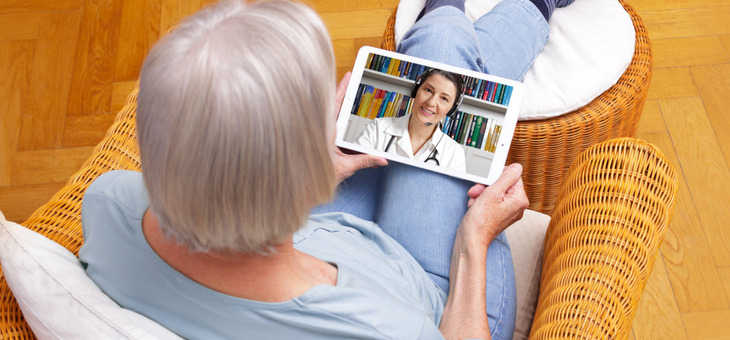Older Australians are keen for telehealth to stay even after things return to normal once COVID-19 has passed.
A Global Centre for Modern Ageing (GCMA) survey of 1200 Australians found that telehealth, whether accessed by phone or online, has worked well, with more than 60 per cent of people aged over 60 surveyed nationally saying they were willing to use telehealth in the future.
The GCMA research, part of an ongoing study, has been released in a report, Telehealth – Here To Stay?, revealing that most older Australians who used telehealth during the pandemic found their experience to be similar to or better than a face-to-face consultation.
For both phone and online consultations, 85 per cent of older Australians said the quality of care/treatment provided was the same or better than normal, and 88 per cent said the value for money was the same or better than they usually experienced.
“Older Australians like telehealth for its convenience, reduced travel and ability to be conducted at home,” said GCMA chief executive Julianne Parkinson.
More than two in three Australians (67 per cent) aged over 60 who used telehealth during the pandemic said they would feel confident using telehealth in the future.
Nearly half (49 per cent) of Australians aged over 60 who used telehealth during the pandemic said they were likely to use telehealth after the pandemic.
Privacy concerns did not appear to be a leading issue for older people using telehealth.
Almost all of those surveyed (more than 95 per cent) aged over 60 said telehealth privacy was the ‘same as normal’ or ‘better than normal’ when compared to face-to-face appointments.
For online consultations, 95 per cent said appointment privacy was the ‘same as normal’ or ‘better than normal’. For phone consultations, 97 per cent said privacy was the ‘same as normal’ or ‘better than normal’.
“What is very apparent is that offering consultations via telephone as well as online is important to Australians aged over 60,” Ms Parkinson said.
“Older Australians were more likely than younger Australians to have taken part in a telephone telehealth appointment during the pandemic.
“We found 44 per cent of people aged over 60 took part in a telephone telehealth appointment or consultation, versus 33 per cent of adults aged under 60.”
In contrast, one in five older Australians surveyed by the GCMA took part in an online appointment or consultation with a health professional during COVID-19.
“The experience of those who took part in digital consultations was positive,” said Ms Parkinson.
“We learnt that 90 per cent of Australians aged over 60 who took part in an online telehealth consultation found booking the appointment the same or better than a normal consultation. And 85 per cent of older Australians who took part in an online telehealth consultation found it easy or very easy to log in or set up their online appointment.”
While a largely positive experience, 38 per cent of Australians aged over 60 did have some difficulties using telehealth.
Challenges included the inability to have a problem examined or receive usual treatment; a less personal experience due to lack of body language and cues; less perceived warmth and less perceived care; difficulties for people with hearing impairment; awkwardness, especially with a new clinician; and tech glitches, a lack of appropriate tech and a lack of tech confidence.
According to a new report into psychologists’ use of telehealth between April and June 2020, Australian psychologists have been quick to adapt to new video-conferencing technologies as well.
The report found that despite struggles with audio-visual lag and sound quality, 98.36 per cent of surveyed psychologists said that they were comfortable working in a video-conferencing environment.
It also found that 98.36 per cent of respondents wanted to continue with telehealth as a regular part of their service offering.
Melbourne-based registered psychologist Heather Marriott says that while the COVID-19 pandemic has brought with it significant social and economic upheavals, it has also been a catalyst for moving Australian mental health care into an important new era.
“We’ve entered an unprecedented era in which psychologists are the new frontline in the fight against the COVID-19 fallout,” Ms Marriott said.
“Issues such as mass unemployment, finance worries, school closures and increases in relationship breakdowns, online gambling and domestic violence are leading to an amplified demand for mental health services.
“The fact that so many psychologists are willing to continue to offer video-conferencing services to their clients shows a significant shift in the industry,” she said.
Have you used telehealth services during the pandemic? How did you find the experience? Would you be keen for these services to continue beyond the pandemic?
If you enjoy our content, don’t keep it to yourself. Share our free eNews with your friends and encourage them to sign up.
Related articles:
https://www.yourlifechoices.com.au/health/wellbeing/what-happens-when-you-stop-sex
https://www.yourlifechoices.com.au/health/your-health/how-education-improves-memory
https://www.yourlifechoices.com.au/health/your-health/poor-sleep-linked-to-heart-disease

